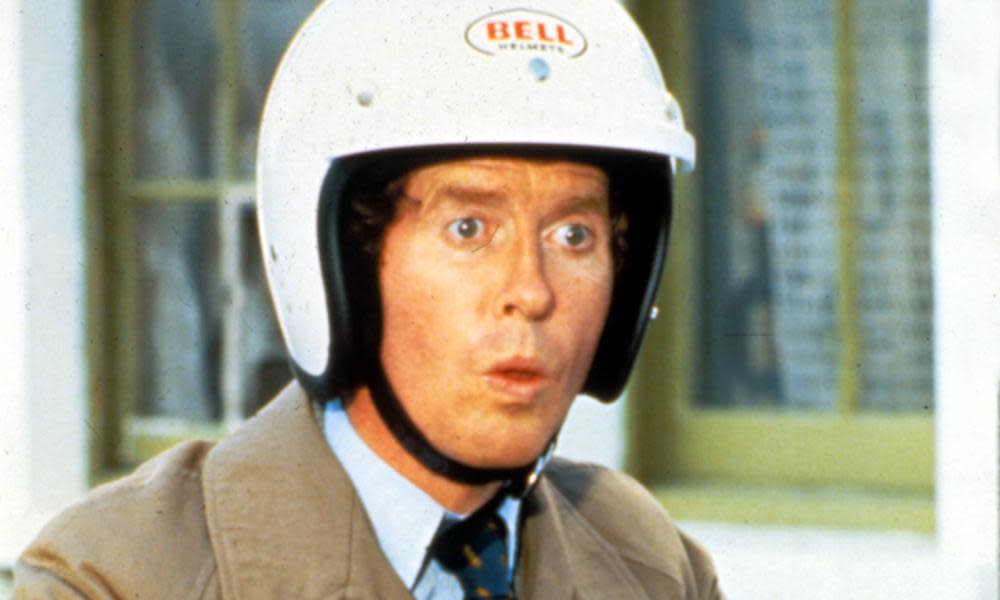What a calamity! Some Mothers Do ’Ave ’Em turned a bit of trouble into comic bliss

Think Peckham market traders ducking and diving for a living. Neurotic hoteliers struggling to run a clapped-out guesthouse. As a rule, sitcoms are built around a distinctive premise or setting and then populated by a bunch of characters, on whose popularity success will depend. One might quibble with the wisdom of reviving these sitcoms, for the stage or any other medium, 40 years after the event – as I did when watching The Good Life at the Theatre Royal Bath a few months back. But at least it’s possible, because – even if you can’t duplicate a Richard Briers or a John Cleese – there’s a predicament there, an inherently amusing situation, on which to build.
But then there’s that subset of sitcoms built around their characters alone, whose whole basis is: let’s wind this character up and watch them do their thing. Count Arthur Strong is one; Miranda is another. So too is Some Mothers Do ’Ave ’Em, a 70s favourite (25 million viewers!) whose premise is simply: hapless man has accidents. Such a show stands or falls on its casting, and Some Mothers Do ’Ave ’Em had casting for the ages. I’ve been watching old episodes in advance of seeing the new theatrical adaptation. Aside from the nostalgia rush of re-engaging with a show that stirs my very earliest family-TV memories, the pleasure has all been about Michael Crawford’s beautiful turn as walking calamity Frank Spencer – with a side order of respect for his on-screen wife and perfect foil, Michelle Dotrice.
Watch the first episode and the absence of a premise is, at first, disconcerting. Perhaps in 1973, when gender roles were less flexible, it was starting point enough to feature an enfeebled and neurotic young husband, incapable of holding down a job or being masculine in any way. To modern eyes, this shades into cartoon: we’re not watching Fleabag any more. And in anyone else’s hands, Frank Spencer might have been too much: too fey, too irritating, too tragic. There’s a very narrow sweet spot to aim for here, where his naivety and lucklessness are funny not frustrating, where his sentimental nature stays the right side of mawkishness.

Crawford nails it, and does so without visibly trying to make us laugh. As his career before (starring alongside Barbra Streisand in the Oscar-winning Hello Dolly, bizarrely) and since suggests, this is a proper craftsperson of stage and screen. You could enjoy Frank Spencer, proto-Mr Bean that he is, with the sound down: Crawford’s expressions, his reactions, his every gesture a minutely choreographed dumbshow of illness-at-ease.
Key, perhaps, is that Crawford doesn’t play Frank’s wrongness; he plays his desperation to get things right. And with such a light touch! “He’s a strange mixture,” Crawford said of the character, “because he’s funny in what he says and how he behaves, but inside he’s boiling. He’s an incredibly sensitive soul. To play the part, you’ve got to know what it feels like when people say things that hurt.”
And then there are the stunts – which is what most people remember of Some Mothers Do ’Ave ’Em. Roller-skating under lorries, tumbling through a hotel room floor, and dangling from a Morris Minor as it teeters off a cliff. Famously, Crawford performed them all himself – and to Joe Pasquale’s credit, he does so too in the stage production, hurtling down a banister, legs akimbo, sending the spindles flying.
However, casting a sexagenarian as Frank Spencer queers the pitch. Childlike innocence and ineptitude is one thing in a 30-year-old, quite another in a man twice his age. The stage show takes as its (tenuous) plot Betty’s announcement of her first pregnancy, and you can’t help noticing that the prospective dad is not far short of pensionable age.
So is this still Frank Spencer? Not really; certainly not if you’ve been bingeing the original in advance. You could argue, I guess, that this is Pasquale’s interpretation of the character (more talkative, less tormented and vulnerable), in the same way actors interpret Hamlet. But Spencer isn’t Hamlet, and (with due respect to his fine scripts) writer Raymond Allen isn’t Shakespeare. Frank in the popular imagination is just the aggregate of the beautifully drawn traits Crawford brought to a familiar character type. Absent them, and you just get the type.
Pasquale gives this lovable klutz persona a decent spin on stage. Susie Blake is on fun form as his mother-in-law – of course, there’s a mother-in-law – and there’s a showstopping set-piece at the end. But the humour on display (double entendres and dry-humping the vicar) is very old-fashioned: the stage show feels creakier and more out-of-its-time than the 1970s originals. As with The Good Life, I see no reason for this stage show to exist other than nostalgia, and theatres’ low confidence these days that they can fill their auditoria with anything original. But they do reconnect us with something special that happened in the past – in this case, an indelible comic turn by Crawford, with which I warmly recommend you (re)acquaint yourself.
• Some Mothers Do ’Ave ’Em is touring the UK until 13 August.


